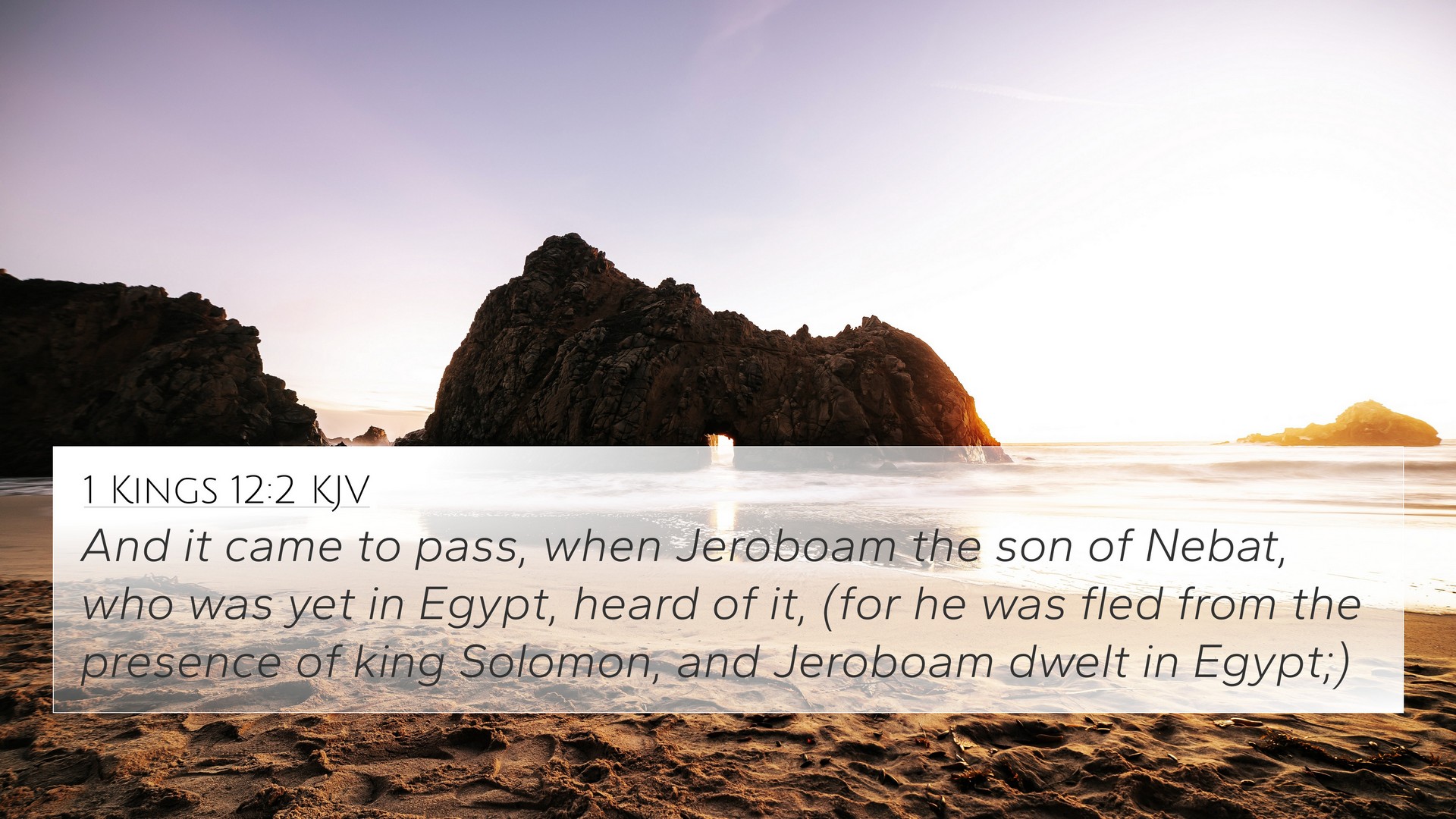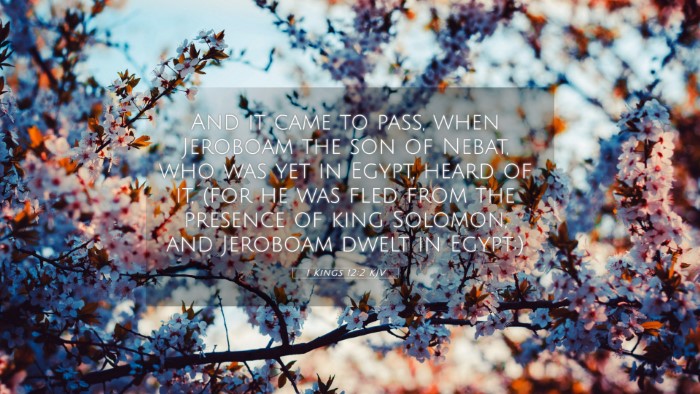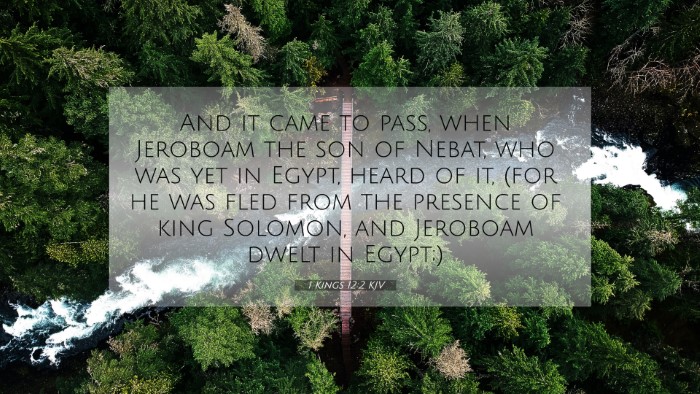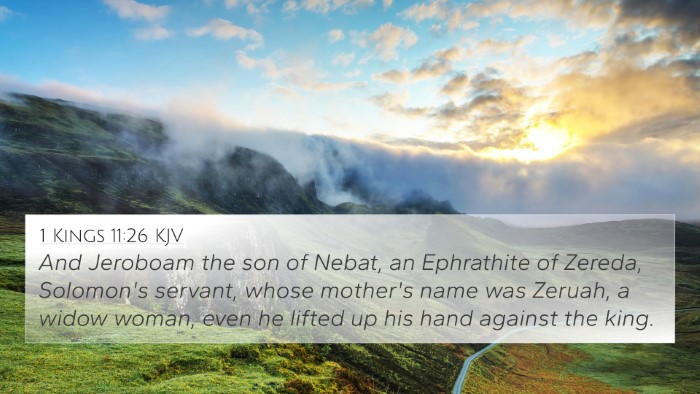Understanding 1 Kings 12:2
The verse from 1 Kings 12:2 states: "And it came to pass, when Jeroboam the son of Nebat, who was yet in Egypt, heard of it, that he returned out of Egypt."
This text signals a pivotal moment in the history of Israel, marking the ascent of Jeroboam as a key figure in the division of the kingdom. With insights from Matthew Henry, Albert Barnes, and Adam Clarke, we will delve into the meanings, implications, and cross-references of this verse.
Contextual Background
Jeroboam was originally appointed by King Solomon to oversee the labor force of the house of Joseph. His eventual conflict with Solomon leads to his exile in Egypt, setting the stage for a return that would significantly alter the Israelite polity.
Commentary Insights
-
Matthew Henry's Commentary:
Henry emphasizes the prophetic nature of Jeroboam's return and God’s sovereignty in raising leaders for His people. Jeroboam, returning from Egypt, served as a fulfillment of prophecy regarding the division of the kingdom.
-
Albert Barnes' Notes:
Barnes highlights the political turmoil of the time, which was exacerbated by Solomon's heavy taxation and forced labor policies. Jeroboam's return is seen as a reaction to the people's dissatisfaction with Solomon's rule, indicating a broader desire for reform and autonomy.
-
Adam Clarke's Commentary:
Clarke notes the significance of Jeroboam's Egyptian refuge, implying that his time in Egypt shaped his political strategies. He underscores the importance of understanding the socio-political context of his return, which was fraught with the tensions of loyalty versus revolt.
Thematic Connections and Cross-References
The verse is rich with connections to other Biblical texts, establishing a web of inter-Biblical dialogue. Below are some significant cross-references and their themes:
- 1 Kings 11:29-39 - This passage details the prophecy regarding Jeroboam, signaling God's intention to divide the kingdom due to Solomon's idolatry.
- 2 Chronicles 10:1-5 - This elaborates on Jeroboam's leadership role in the division of Israel and his subsequent gathering of the people.
- 1 Kings 12:16 - The people's reaction to Jeroboam’s leadership is pivotal in understanding the dynamics of Israel's new governance.
- Isaiah 7:17 - This underscores the theme of judgment on the house of David, which resonates with the outcomes of Jeroboam’s rise.
- Hosea 1:1 - Jeroboam’s reign is significant in prophetic writings, emphasizing God's dealings with Israel during his time.
- Matthew 1:12 - This mentions the lineage of Jesus, connecting back to the divisions in Israel arising from Jeroboam's actions.
- Galatians 5:13 - While not directly related, the principle of freedom versus slavery can apply to the governance issues and Jeroboam’s rise amid oppression.
Comparative Bible Verse Analysis
Understanding 1 Kings 12:2 requires a look at its implications in both the historical and theological sense. The themes of leadership, divine intervention, and societal response resonate throughout Biblical texts.
Biblical cross-referencing can yield insights into how Jeroboam's leadership reflects broader themes within the scripture:
-
David's lineage and kingship:
The fracturing of David's united kingdom showcases the fragility of leadership and the consequences of turning away from God (see Psalm 78:67-72). Jeroboam’s ascent can be seen as a result of these actions.
-
The symbolism of Egypt:
Egypt represents both refuge and oppression in the Bible. Jeroboam’s return from Egypt highlights a significant shift in the people’s expectation of leadership (see Exodus 3:10).
Scriptural Cross-Referencing Tools
To fully grasp the connections that exist within the scriptures, consider using various tools for cross-referencing:
- Bible Concordance: This is vital for locating specific verses and themes that connect across books.
- Bible Cross-reference Guide: Such a guide can simplify the process of identifying related scriptures to a given verse.
- Bible Chain References: Utilizing chain references can help trace concepts and characters throughout the Bible.
Conclusion
The return of Jeroboam from Egypt is not just a historical note; it is a profound moment that invites contemplation on leadership, divine purpose, and the societal yearning for change. Utilizing the insights gathered from historical commentaries and cross-referencing with thematic connections illuminates the depths of 1 Kings 12:2. Each aspect offers a glimpse into how scripture dialogues with itself, providing a robust framework for understanding the text within the entirety of Biblical history.





